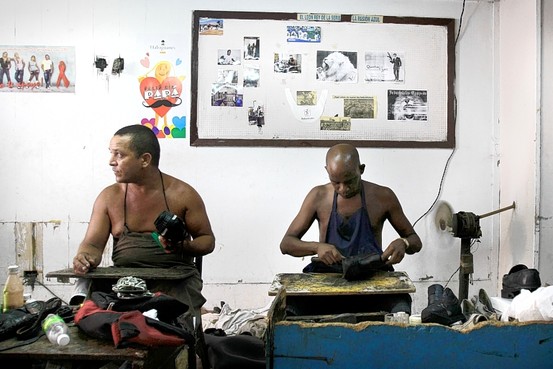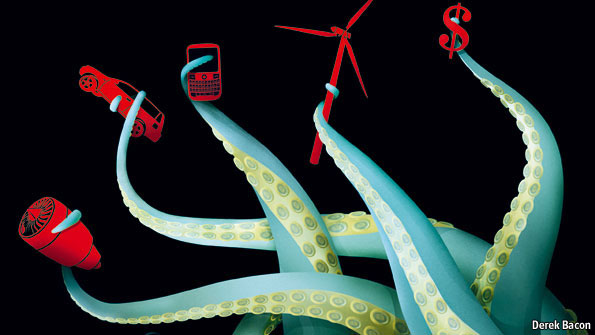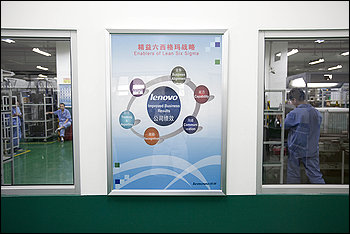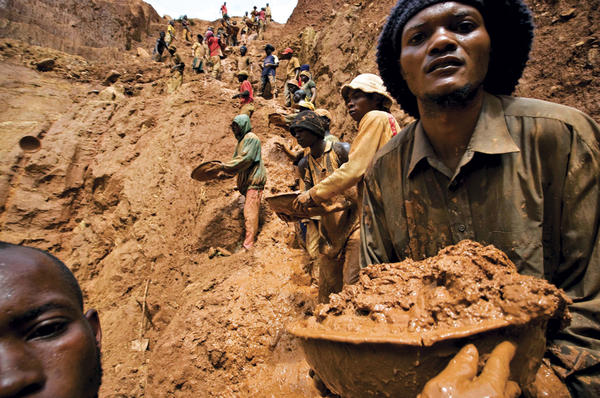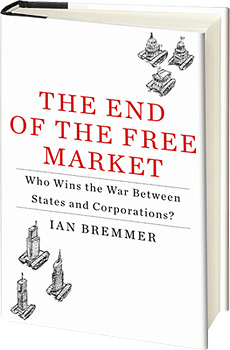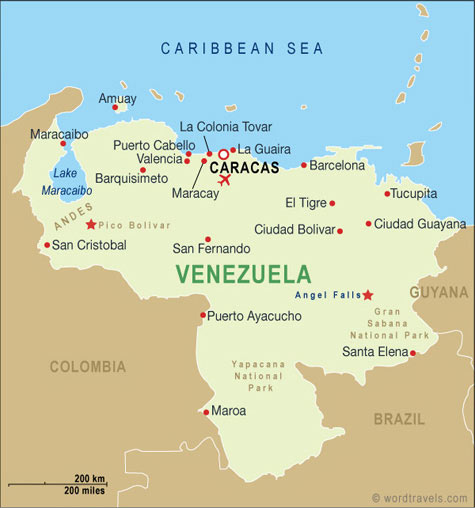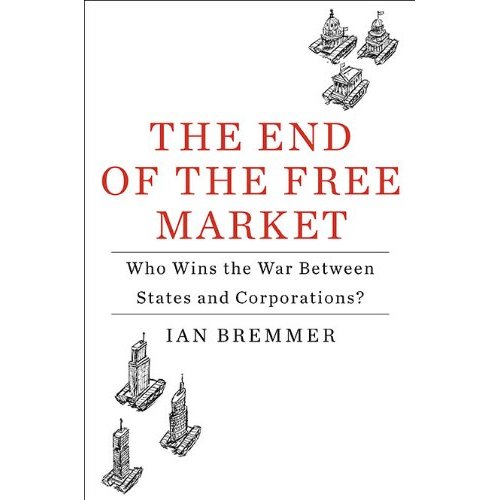On Thursday, my new book makes its debut. It's called The End of the Free Market: Who Wins the War Between States and Corporations? Here's the book in a nutshell:
A generation ago, the collapse of communism made clear that government can't simply mandate lasting economic growth. To fuel the rising prosperity on which their long-term survival will depend, political leaders in China, Russia, the Arab monarchies of the Persian Gulf and other authoritarian states have accepted that they have to embrace market-based capitalism. But if they leave it entirely to market forces to determine winners and losers, they run the risk of enriching those who will use their new wealth to challenge the state's power.
Instead, they have embraced state capitalism. Within these countries, political elites use state-owned and politically loyal, privately owned companies to dominate entire economic sectors -- like oil, natural gas, aviation, shipping, power generation, arms production, telecommunications, metals, minerals, petrochem icals, and other industries. They finance all these institutions with the help of increasingly large pools of surplus foreign cash known as sovereign wealth funds.
In the process, the state uses markets to create wealth that can be directed as political officials see fit. The ultimate motive is not economic (maximizing growth) but political (maximizing the state's power and the leadership's chances of survival).
And with Europe in turmoil, a politically paralyzed Japan, and high unemployment with rising public anger in America, state capitalist China's robust recovery from the slowdown is looking awfully attractive for would-be imitators across the developing world.
The first reviews are in, and I want to draw attention to a really interesting piece written by my colleague Tom Barnett for World Politics Review. It raises some issues I'd like to go into further. Here's what Tom said about the book:
What should America do amid China's continuing rise? It should continue to believe in itself and free markets, says Ian Bremmer in his misleadingly titled, "The End of the Free Market: Who Wins the War between States and Corporations." .... Bremmer's slim volume is anything but an obituary for free markets. Indeed, his caveat-laden celebration of the "emergence of state capitalism" only underscores the inevitability of its eventual demise, as he explicitly makes clear throughout the text.
After all, this "whole new kind of challenge" appears only in states that have never sustained democracy. That, though, is a tipoff for state capitalism's biggest weakness: It chooses the political survival of the regime over economic efficiency and innovation. Thus, according to Bremmer, "in the end, it's much more likely that the Chinese leadership will have to reconsider core assumptions about government's role in an economy than that the leaders in the United States will retreat fundamentally from free-market principles."
Indeed, the weakness that characterizes Bremmer's list of "threats" posed by state capitalism should energize America's free marketers all the more: China drives up global commodity prices by paying above-market prices; Beijing's desperate race to lock down resources around the planet forces it into patron-client relationships with the world's most unstable, corrupt and needy regimes; China's amoral approach to trade and investment helps insulate these bad regimes from Western criticism; and, in its gross inefficiencies, China's state capitalism might prevent the global economy from reaching its productive potential just as the emerging global middle class needs it most.
That's it. China's state capitalism risks ghettoizing its economy and beggaring both itself and those regimes it manages to suck into its mercantilist orbit, while making the rest of the world a little bit poorer in the process: so much for the "war between states and corporations."
In the end, one should emerge from reading Bremmer's excellent, if grossly mislabeled, book with even more confidence in the future of free markets. Clearly, it's not our job to ape China's state-heavy economy, but rather to maintain -- as much as possible -- our own free market environment here in America, while continuing to champion that model's utility in unleashing and leveraging human ingenuity in the decades ahead."
Tom and I agree on a lot, including on the idea of sharing a few thoughts on this subject on our respective blogs. But it's most interesting to focus on those issues where I think we disagree.
So Tom, let me first address the question of the book's title: The End of the Free Market. I'm actually a bit more circumspect here than I think you're giving me credit for. My view is that for the past several decades, it's pretty safe to say we've been living in a largely free market world. Multinational companies based in free-market economies became dominant economic actors on the global stage by profiting from increased access to capital, consumers, and workers in both developed and developing countries around the world. Governments seemed less relevant as ideas, information, people, money, goods and services crossed international borders at unprecedented speed -- and on a scale that makes these processes qualitatively different than anything that came before.
I think we've hit a tipping point with the rise of state capitalism -- particularly, but not exclusively, in China -- a trend compounded by the lasting damage that the financial crisis has inflicted on the free market model and the crisis of confidence we're seeing in America, Europe, and Japan.
I'm not arguing that the free-market world is gone with the wind. Ultimately, as Tom acknowledges, I believe that its core strengths -- and state capitalism's built-in problems -- will probably decide the outcome of the conflict between them. But that's a long-term process, and the outcome is far from certain ... which is why the full title ends in a question mark.
What comes next?
I believe that things are going to get worse for free markets before they get better. China might be sitting on a bubble, but it's not the one that James Chanos is pointing toward, one that will pop as soon as China's real estate boom goes bust. Nor is it the scenario described by Gordon Chang in which the Chinese people rise up to challenge the Chinese government. I could mention the labor bubble (200 million Chinese men with no hope of finding spouses), the environmental bubble (no water, no arable land, no breathable air), or any of the dozens of other bubbles floating ominously across the Chinese landscape. All of them are serious. None are certain to threaten China's state capitalist system anytime soon. I'd bet confidently on strong state-led Chinese growth over the next decade. Intensified national pride will only strengthen the system in the near term.
Second, the situation will get much worse for free markets because anemic growth and high unemployment in the developed world will feed a backlash against free market sentiment. We're already seeing more support for protectionism and a tougher stance on immigration in both Europe and the United States. In America, Goldman Sachs is today's scapegoat, but China is next in line, whether the subject is currency policy, cyber-security, trade imbalances, product safety, or something else.
All of that makes the recommendation that you and I share -- strong government support of basic free market principles -- one that looks increasingly vulnerable to populist politics within free market democracies. The problem is even larger in Europe and Japan than in America.
It's encouraging that state capitalism isn't really exportable. In Stefan Halper's otherwise excellent book, The Beijing Consensus, he implies that lots of countries are going to join with China to support this model. I don't think so -- and it looks like you don't either.
State capitalism isn't an ideology. It's more a set of management principles. It can never match the hold that communism once had on the popular imagination, because it wasn't born as a response to injustice. It was created to maximize political leverage and state profits, not to right historical wrongs. The system is not the same from one country to another, because the ruling elites in Beijing, Moscow, and Riyadh use it to meet distinctly different sets of needs. And no two state capitalist governments can ever fully align their interests. By its very nature, it's exclusionary; like mercantilism, it promotes one state at the expense of others. That's why there can't really be any kind of "state capitalist consensus."
Instead, you get client states -- mainly smaller Asian countries in China's shadow and energy exporting governments in Africa and Latin America badly in need of friends with deep pockets. Brazil, India and other big emerging markets that have elements of both free market and state capitalist systems have seats at the G20 table alongside some serious free market skeptics. The developed states don't have much to offer them at the moment that looks attractive for their economic stability.
In short, it's possible that I'm only an optimist on this subject because I'm an optimist about most things. Looking at the world more analytically, the global economy we can expect looks quite different from the one we've known these past several decades.
In reply, Ian, I would simply say that you're a bit guilty of trying too hard to sell the "unprecedented" nature of state capitalism's rise (a small editorial sin, considering you're selling a very good book). I think it's misleading to suggest that the "past several decades" were some golden age for free markets and Western multinationals, because it's not like OPEC's national oil companies or China's state-owned/-dominated enterprises came out of nowhere--they've been there all along. The rising relevance of these companies is real, but we're talking a matter of degree and only in states that have historically featured authoritarian governments, so the structural impact on the system is, in my mind, not as significant as you make it out to be (so it's taking longer than the optimists declared regarding political pluralism in recently marketized regions--big deal!).
The vast bulk of wealth in the system remains in private hands; sovereign wealth funds control a mere fraction of that. So I just don't recognize the "tipping point" that you do between a free-market-dominated global economy of yesteryear and one that's increasingly steered by single-party states, especially when, as you note both here and in your book, those regimes really don't share any truly exportable ideological consensus.
I do see the world moving through an extended period of frontier-integration, and in such periods, the role of the state naturally grows, especially following a period of globalization's stunning expansion as part of three decades of progressive deregulation. I think we were fortunate to add all the democracies that we did during that rapid expansion, but I wasn't particularly surprised that most former socialist states didn't complete the journey, given their respective political histories and the pervasiveness of their poverty. For most of those states, I think the usual historical expectations apply, meaning we're looking at single-party states (with elections or not) for 2-to-3 generations (or 4-5 decades). That means we should expect a fourth great wave of democratization in the 2020s and extending into the 2030s--or 40 to 50 years after the great expansion of globalization began in the 1980s (opening these states up to wider market connectivity).
As you note, we don't see the world all that differently (I will note that you are--just like me!--another expert on globalization who began his career in the Soviet studies sphere). I think we just have different comfort levels regarding how long it takes for these things to work themselves out. You spot a disturbing critical mass of state capitalism that portends a more uncertain future for free markets (i.e., an upper-hand argument), where I see a more natural course correction (i.e., more yin-yang) based on globalization's growth--namely, a period of expansion through deregulation and less state involvement followed by a period of consolidation through re-regulation and more state involvement. But we both retain the same faith in the superiority of free markets accompanied by political pluralism, so it's a question of the journey's length and not of its final destination.
Again, I congratulate you on a most excellent book and I hope it does well.
 Monday, September 20, 2010 at 12:05AM
Monday, September 20, 2010 at 12:05AM  Moscow Times op-ed by a biz strategist consultant (via WPR's Media Roundup).
Moscow Times op-ed by a biz strategist consultant (via WPR's Media Roundup). China,
China,  Russia,
Russia,  state capitalism,
state capitalism,  technology | in
technology | in  Citation Post |
Citation Post |  Email Article |
Email Article |  Permalink |
Permalink |  Print Article
Print Article 








